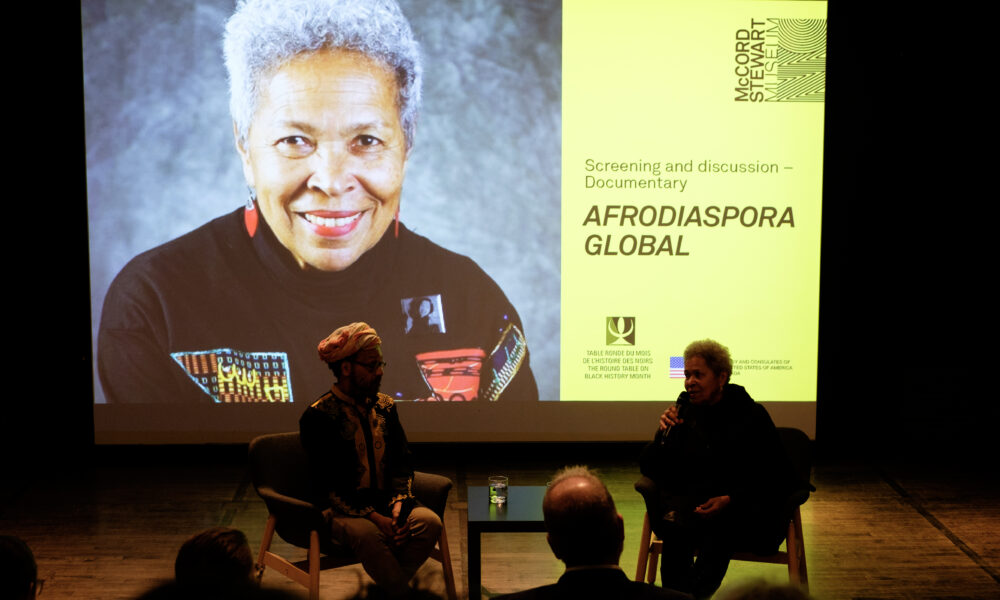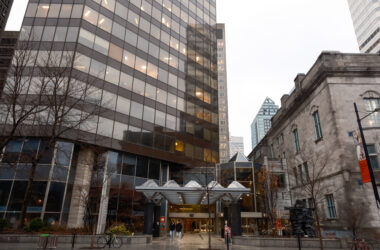Cultural anthropologist and documentary filmmaker Sheila Walker hosted a discussion for McGill faculty members and students on the morning of Feb. 14 on the individuality of Black peoples across the globe, especially outside of the Atlantic world. On the evening of Feb. 14, Walker’s documentary, Familiar Faces, Unexpected Places: A Global African Diaspora, was screened at the McCord Stewart Museum.
Hosted by McGill’s Faculty of Law, the event began with an acknowledgement from Frédéric Mégret—Co-Director of McGill’s Centre for Human Rights & Legal Pluralism—that James McGill, the university’s namesake, enslaved at least five Black and Indigenous people throughout his life. Mégret recognized that McGill’s wealth, which was built by exploiting the labour of the people that he enslaved and his participation in transatlantic slavery, was part of the foundation of the university.
Tamara Thermitus, Boulton Senior Fellow in the Faculty of Law, subsequently introduced Walker and spoke to the importance of including Black history in curriculums.
“I think it’s important to talk [about the fact that] there’s not a Black community, but there’s multiple Black communities. When we say there’s only one Black community, we erase part of our history again,” Thermitus said. “Black History Month is not only an event, but it’s also a time for reflection and taking stock.”
Walker began by highlighting the central theme of her research: Exploring Black communities outside of North America and Africa. She also asserted that the history of genocide of Indigenous peoples and the mass enslavement of Black people is what shaped the continents. Thus, Walker argued, defining all of the Western hemisphere as a “European creation” leaves out the majority of the historical demographics of the Americas.
“There’s a problem with seeing the Americans then as a European creation [….] It was originally characterized as a meeting of two worlds,” Walker said. “I think some Native Americans [said] ‘What do you mean meeting? It wasn’t a meeting.’ And then some Africans said, ‘What do you mean two worlds? What about us?’ So, it was really a meeting of three worlds.”
Several hours later, Walker’s film Familiar Faces, Unexpected Places: A Global African Diaspora was screened at the McCord Stewart Museum and was followed by a joint discussion between Walker and Michael P. Farkas, President of the Board of the Roundtable on Black History Month. Walker’s 30-minute film focused on the global nature of the African diaspora, shedding light on Black communities such as the ones in Argentina, Chile, and India. The film also looked into various aspects of global Black spirituality, focusing on Black Saints in the Catholic church.
In an interview with The Tribune, Walker explained that the film is made with footage that she shot with no intention during her travels, but that ended up showing the commonalities and differences within various Afro-communities. While she was well-versed with the African diaspora in the Americas, she became interested in researching non-Atlantic Black communities after a 2006 conference in India.
“While there, I met Afro-Indians from various parts of the country,” Walker said. “Did I know they were there? No. So, it was a great experience, and then I got to know more about the global nature of the African diaspora, and the sense of consciousness of peoples’ belonging to the African diaspora.”
Following the film screening, Sarr led a discussion with Walker and questioned whether the countries that Walker investigated were conscious of having Black communities.
“Many [countries] like Argentina, there’s a lot of denial […] that there’s even a Black community. As a minority group in the country, they are severely marginalized [….] Especially [in] Turkey, India, Bolivia, where it’s less known that there’s even a Black community,” Sarr said.
Walker went on to explain that while there are countries, such as Chile, with governments that deny the very existence of African citizens, it’s becoming increasingly difficult to take this stance as African peoples across the globe have mobilized for their recognition.
“All the countries in the Americas have organized groups of African descendants, in places where they’re generally denied to exist,” Walker said. “In the past 20 years, they have done so much to recuperate their African culture.”









